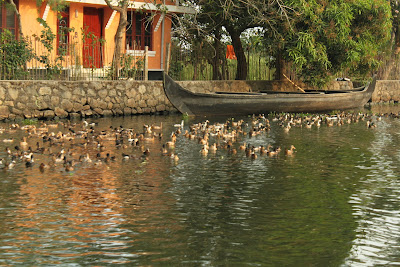Spicy food, shaded waterways, weatherbeaten fishermen and St Joseph's Parish Hall. Born on the bayou? It did feel like Louisiana - until I saw a local taking a bath and brushing his teeth, in the canal. I was definitely still in India, where thousand year old customs collide with the present day, every day. The backwaters of Kerala, India's lush
Life is lived at the water's edge. People bustle back and forth to town while uniformed schoolkids march along the stone-built banks. Coconuts palms and drooping mango trees dominated the skyline while green thickets of water hyacinth choke the narrower channels. Each house has a set of stone steps leading into the water, where bathing and dish washing take place. Communal wells supply drinking and cooking needs. In the backwaters, schools, stores, temples and restaurants face the bank and boats are the only mode of travel. I spent a day on the canals with a couple of other travelers and a cheerfully buoyant local guide named Saidu.
 Adi, the ever-smiling owner of our guesthouse in Alleppy, gave a Spanish girl and me a lift on the back of his Honda down to the docks at eight o'clock in the morning, where we met Saidu and jumped on a battered red and white passenger ferry. It wasn't long until we were out of town, across the lake and into the smaller channels. Breakfast and tea at our guide's house and into a canoe with Saidu at the stern. A wooden boat, 20 feet long, one seat behind the other under a canopy. And the soft, rhythmic sploosh. . . sploosh of Saidu's paddle.
Adi, the ever-smiling owner of our guesthouse in Alleppy, gave a Spanish girl and me a lift on the back of his Honda down to the docks at eight o'clock in the morning, where we met Saidu and jumped on a battered red and white passenger ferry. It wasn't long until we were out of town, across the lake and into the smaller channels. Breakfast and tea at our guide's house and into a canoe with Saidu at the stern. A wooden boat, 20 feet long, one seat behind the other under a canopy. And the soft, rhythmic sploosh. . . sploosh of Saidu's paddle.  It was a mellow day on the water, sunny and serene, as we toured Saidu's old stomping grounds. Women washed, men paddled and the high voices of children called out. We explored a few villages and survived some mild evangelizing when we stopped at church (to use the bathroom). Lunch was tasty and typical - rice and several sauces, vegetables and pickle served on a smooth green banana leaf. Sitting canalside in the sun, I drank a pale, yeasty glass of coconut beer and dug the scene.
It was a mellow day on the water, sunny and serene, as we toured Saidu's old stomping grounds. Women washed, men paddled and the high voices of children called out. We explored a few villages and survived some mild evangelizing when we stopped at church (to use the bathroom). Lunch was tasty and typical - rice and several sauces, vegetables and pickle served on a smooth green banana leaf. Sitting canalside in the sun, I drank a pale, yeasty glass of coconut beer and dug the scene.The afternoon slipped by, and as I laid back on the cushions my mind began to wander back to the night before. I'd found a small food cart on a dark corner by the beach where a solemn old cook served fresh, crispy-fried chilies with chutney and strong ginger tea. . . We'd played the spice game, a ritual practiced all over the world, anywhere foreigners and hot cuisine collide. I gestured for the chilies and he shook his head no, fanning his open mouth to indicate their heat. In turn, I signaled that I knew, and I liked them. As I chewed the peppers (which were damn hot), everyone gathered at the cart stared and waited. Waited for the sweat, the coughing, the tearing eyes, the cries for water. When I calmly finished my plate and asked for more, there was murmuring, laughter and a tiny smile from the cook: the cultural breakthrough. Little did they know that almost two years of eating in South Korea had burned off my taste buds long ago. An unfair advantage?
As the afternoon light softened, we retraced our steps to town and found ourselves saying goodbye to Saidu on the dock in Alleppy. The roaring, belching bus and high, raspy whine of rickshaws made those hours on the placid water all the more precious, and I thanked our guide warmly. With a few good books and a little coconut beer it would be easy to spend weeks, lost in time, in the green and wet of the backwaters. I turned reluctantly from the canal to catch a rickshaw back to the guesthouse, immediately catching the smiling eye of a waiting driver. It wasn't so bad to be on dry land, I thought as we careened through the streets of Alleppy. There was still enough light for a swim at the beach. And the chili cook would be setting up his cart. . .







No comments:
Post a Comment